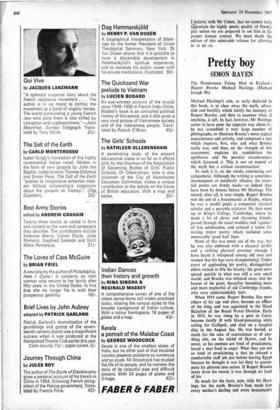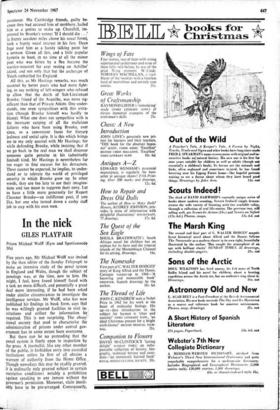Pretty boy
SIMON RAVEN
Michael Hastings's aim, as early declared in this book, is to clear away the myth, adora- tion and hostility which falsify the memory of Rupert Brooke, and then to examine what, if anything, is left. In fact, however, Mr Hastings seems to have gone the opposite way about it: he has assembled a very large number of photographs, to illustrate Brooke's more typical acquaintance and activity, and composed a text which inquires, first, who and what Brooke really was, and then, on the strength of this assessment, explains his candidature for apotheosis and the peculiar circumstances which favoured it. This is not an exposé of the myth but a critical reconstruction.
As such it is, on the whole, convincing and sympathetic. Although the writing is sometimes inconsequent or needlessly allusive, the essen- tial points are firmly made—as S indeed they have been by dozens before Mr Hastings. The record, after all, is very simple. Rupert Brooke was the son of a housemaster at Rugby, where he was a model pupil, a competent classical scholar and a passable cricketer. He then went up to King's College, Cambridge, where he made a lot of clever and charming friends, passed through the usual muddles and 'agonies' of late adolescence, and evinced a talent for writing minor poetry which included some memorable 'good bad' lines.
None of this was much out of the way, but he was also endowed with a classical profile and a striking physical presence (though I have heard it whispered among old men and women that his legs were disappointing). Under cover of applauding his poetry, distinguished elders rushed to fête his beauty; the good news spread quickly in what was still a very small world; and Brooke was whisked away into the houses of the great, thereafter becoming more and more neglectful of old Cambridge friends, who were understandably hurt.
When 1914 came, Rupert Brooke, like most others of his age and class, became an officer of the king, and was appointed to the Hood Battalion of the Royal Naval Division. Early in 1915, he was stung by a gnat in Cairo, became fatally ill with blood-poisoning while sailing for Gallipoli, and died on a hospital ship in the Aegean Sea: He was buried, as much for the sake of convenience as of any- thing else, on the island of Skyros, and he never, as his enemies are fond of proclaiming, heard a shot fired in anger. What they are not so fond of proclaiming is that he refused a comfortable staff job just before leaving Egypt because he thought it was his duty to accom- pany his platoon into action. If Rupert Brooke never drew his sword, it was through no fault of his.
So much for the facts; now, with Mr Hast- ings, for the myth. Brooke's face made him every mother's darling and every housemaid's paramour. His Cambridge friends, guilty be- cause they had accused him of snobbery, hailed him as a genius to make up. Churchill, im- pressed by Brooke's sonnet `If I should die ...' (a happy accident miles above his usual form), took a highly vocal interest in his fate. Dean Inge used him as a handy talking point for a sermon. Given all this, and a little popular hysteria to boot, in no time at all the minor poet who was bitten by a flea became the warrior-minstrel for ever resting on Achilles' island, and not only that but the archetype of Youth embattled for England.
All this, as Mr Hastings remarks, was much resented by better poets who had more fight- ing, to say nothing of left-wingers who refused to allow that the death of Sub-Lieutenant Brooke, friend of the Asquiths, was more sig- nificant than that of Private Atkins. One under- stands, one even sympathises with this irrita- tion (though Brooke himself was hardly to blame). What one does not sympathise with is the incessant carping of all the malicious failures who have been using Brooke, ever since, as a convenient focus for literary jealousy and social spite. It is this which brings me to my only quarrel with Mr Hastings; for while defending Brooke, while insisting that if we go back to the real man we shall discover someone quite genuine in his (admittedly limited) kind, Mr Hastings is nevertheless far too eager to find excuses for his detractors. These cannot be expected, he implies, to under- stand or to tolerate the world of privileged security in which Brooke grew up. In other words, they are too lazy to use their imagina- tions and too mean to suppress their envy. Let us have a little more generosity for Rupert Chawner Brooke—an indifferent poet, if you like, but one who turned down a cushy staff job to stay with his own men.















































 Previous page
Previous page